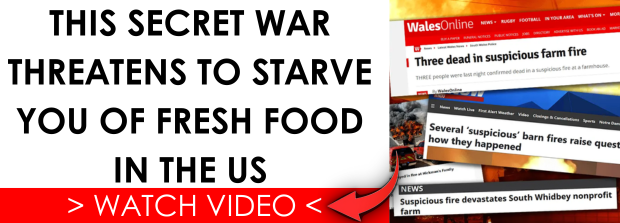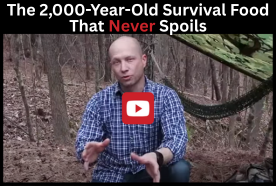How to Stay Sane When the World Feels Like It’s Ending – Survivopedia

This is a topic I cherish deeply and I’ve been telling people a lot, like a broken record if you will, that keeping a clear and safe mind is critical during a crisis. You can stockpile a decade’s worth of food and fortify your property like a medieval castle, but that’s not enough. None of it matters if your mind breaks before your supplies run out.
Mental resilience isn’t some soft skill you address after handling the “real” preparedness work. It’s the foundation everything else rests on. As time goes by and a crisis stretches from days into weeks, then months, then becomes the new permanent reality, that’s when the psychological toll hits hardest.

The initial adrenaline fades and the shock eventually wears off. You’re left with the grinding awareness that normal isn’t coming back, and you’ve got to find a way to function anyway. Not just survive, but actually live with some measure of sanity and purpose.
This isn’t about toxic positivity or pretending everything’s fine when it clearly isn’t. I’m trying to help people understand that building mental structures that keep you functional when the world you knew has fundamentally changed equals survival. Professional mental health support won’t be available and psychiatric medications are no longer viable options when the proverbial brown stuff hits the fan.
>>That’s why having a field medical plan for mind and body matters more than people think. See the guide many off-grid families rely on when no doctor is coming.
Your Mind Breaks Before Your Body Does
The human body is remarkably resilient and if you think about it, people have survived months of near-starvation, extreme temperatures, and brutal physical conditions. The mind, though? That’s often the first casualty of a prolonged crisis.
Depression hits when you lose hope that things will improve. Anxiety spikes when you can’t predict or control what happens next. Trauma accumulates from witnessing things you can’t unsee. Grief compounds as you lose people, places, routines, and the life you expected to live. Add sleep deprivation, nutritional deficiencies, and constant stress hormones flooding your system, and you’ve got a recipe for psychological collapse.
>>When nutrition suffers, so does your mood. Having stable, nourishing food helps keep your brain chemistry balanced. That’s why long-shelf-life, protein-rich staples can make the difference.
Mental breakdown doesn’t announce itself with clear symptoms you can diagnose and treat. It creeps in gradually. There are signs that show you’re on a downward spiral and one of these is you will stop caring about hygiene. The tasks that once seemed manageable feel insurmountable. Even more, you snap at people you love over nothing and you stop planning beyond the next hour. Eventually, thoughts about giving up entirely starts slowly creeping.
Some people even develop full trauma responses like flashbacks, hypervigilance, emotional numbing, dissociation. Others slide into functional depression where they’re going through motions but feeling nothing. Still others become manic, throwing themselves into frantic activity to avoid processing reality.
Some may read the above lines and think only the weak go through all of that, but the reality is that none of this makes you weak. It just makes you human. The difference between people who maintain sanity during extended crisis and those who don’t isn’t inherent mental toughness. I believe is having frameworks and routines that protect psychological health even when circumstances are objectively terrible.
The Non-Negotiable Daily Structure
In crisis, when the outside world is unstable, structure is what keeps your mind from unraveling. Routine might feel dull under normal circumstances, but in survival conditions it becomes your lifeline. Waking up at the same time each day, even when there’s no job, no alarm, and nothing scheduled, anchors your body’s circadian rhythm. Pick a time and stick to it because if you let yourself drift into “wake whenever,” your sleep cycles collapse into disorder, dragging your mental health down with them.
The mornings should begin with a ritual you repeat without fail. It doesn’t matter if it’s brewing coffee in silence, reading scripture, meditating, or stretching for five minutes. The details aren’t as important as the consistency. You’re telling your brain it’s following the framework of a normal day.
Movement is another cornerstone and it has nothing to do with motivation or optional workouts, but rather with a mandatory physical activity. Aim for a minimum of thirty minutes, every single day. Walk laps around your block, chop wood, do bodyweight squats and push-ups, tend a garden, whatever fits your environment and emotions. The point is to engage your body so your stress hormones regulate, your sleep improves, and your brain doesn’t sink into the fog that comes from too much idleness.
>>Even small-space gardening helps restore calm and purpose. Discover a compact 20-square-foot system that grows greens and fish year-round.
Meals are more than calories and during a crisis they are also time-markers. Eating at set times stabilizes blood sugar, which directly affects mood, energy, and mental clarity. Even if you’re rationing meager portions, the act of sitting down at consistent times creates a sense of order. Finally, end your day deliberately. Review what happened, plan for tomorrow, then signal to yourself that work is done. This nightly shutdown ritual is what separates productivity from rest and prevents the slow burn of constant vigilance.
Structure, in short, maintains sanity when predictability has vanished.
Create Work When There’s No Work
Humans are purpose-driven creatures and without goals, we decline fast. You’ve seen retirees fall apart, or worse, without a plan. People tend to lose themselves when stripped of meaningful work. The same mechanism works in crisis and the projects you take on are your lifeline: build a chicken coop, repair gear, dig a fire pit, plant a garden. The task doesn’t matter as much as the tangible progress it brings.
Large jobs must be broken down into daily, bite-sized goals. Building that chicken coop may be overwhelming for some, but cutting six support posts or attaching one panel is concrete and achievable for most folks. Each small completion gives your brain a hit of satisfaction, the sense of forward momentum that keeps depression from taking root.
Skill-building fits into this category too so learning skills like food preservation, basic medical abilities, repair techniques, or any craft tied to your reality occupies mental bandwidth. This keeps your brain from spiraling into worry and adds competence that strengthens confidence.
>>If you want to deepen your herbal or natural healing skills, explore the old-world remedies passed down for generations.
If you’re alone, this becomes even more crucial since there’s no “shoulder to cry on”. Self-imposed work hours, written task lists, and accountability to yourself are survival necessities. In groups, work must be divided and each person (kids included) should own a domain others depend on. This balance of responsibility and interdependence keeps morale intact and prevents free-riding that breeds resentment.
Managing Thought Loops
Extended crises invite destructive mental patterns: rumination, replaying disasters, catastrophic predictions about the future. These loops are automatic, and they’ll hollow you out if unchecked. The key isn’t to “just stop” because that never works. Instead, you redirect to physical work, detailed planning, or even skill practice to pull your brain into tangible focus.
Some find it useful to schedule worry, like fifteen minutes a day where you deliberately think about fears, then shut it down. Others break the spiral with grounding techniques like the 5-4-3-2-1 method (five things you see, four touch, three hear, two smell, one taste). Still others need blunt interruption: saying “stop” out loud, snapping a rubber band on the wrist, or changing rooms. Everyone needs different approaches because we are not the same.
For trauma responses like flashbacks, intrusive memories, grounding in the present is non-negotiable. Cold water on your face, holding ice, or focusing on physical sensation pulls you back into reality. The goal is simple: move from abstract worry into concrete action.
>>Reliable water is part of that grounding. See the simple device that draws clean drinking water straight from the air.
The Loneliness Factor
Isolation is poison for the brain because humans are social animals, and without connection we deteriorate both physically and mentally. If you’re alone, you need to create a connection of some sort. Talk to yourself out loud to keep language centers engaged. Write letters, even unsent ones and hold imaginary conversations with people you’re missing. It may sound silly and strange, but it prevents the mental decay that comes from silence.
If you live with family or a group, the problem is different: too much proximity, no privacy, and endless tension. The fix is deliberate alone time and even one daily hour where each person does solitary activity is enough to cool tempers.
Conflict will happen and you need to expect it. Address it early, apologize when you’re wrong, forgive when others slip up. Holding grudges in close quarters is a death sentence for morale. Kids in particular need responsibility alongside routine and play. They aren’t fragile decorations and they’re developing people who gain resilience through meaningful roles. For couples, physical closeness is essential and holding, touching, and simple affection matter more than desire.
>>Feeling secure in your home also eases constant stress. Learn how families are discreetly hardening their homes against danger.
Without it, bonds break and dangerous though start creeping in.
Faith and Meaning
When circumstances grind you down, you need a reason to keep going. For some, it’s religious, and it’s very well known that prayer, ritual, or scripture provide comfort and structure. For others, it’s family, survival for future rebuilding, or even a personal conviction that enduring proves something. What matters is having meaning in suffering.
>>Faith-based living often includes care for the body too. Discover scriptural remedies that strengthen health naturally.
Gratitude is part of this. Not toxic optimism, but noticing the small things that aren’t terrible. The sun warming your face, a safe and quite corner to sleep or perhaps one good laugh in a day. These acknowledgments prevent your brain from painting everything as uniformly hopeless.
When Dark Thoughts Win
Extended hardship often brings suicidal ideation and it’s more common than most preparedness guides admit. Passive thoughts like “I wish I wouldn’t wake up” are different from active planning, but both matter. Recognize these as symptoms of exhaustion and stress chemistry, not truth.
Interventions are simple but powerful: externalize the thought by telling someone, delay action by promising yourself “tomorrow,” and remove access to lethal means. Break life into tiny increments: make it to dinner, make it to morning. For group members, take signs seriously and remove means, increase monitoring, and keep them engaged.
>>Training beforehand helps prevent panic. See the step-by-step manual that teaches calm medical response when help is gone.
Don’t dismiss it as venting because that’s a mistake you can’t come back from.
Humor and Adaptation
Humor is medicine and even dark jokes, absurd observations and dumb humor release stress and bond people together. Laughter triggers neurochemicals that blunt cortisol and reset mood. Kids especially need play and laughter because that’s how they process trauma.
Adaptation is the brutal truth and the sad or fortunate thing (depends on how you look at it) is that humans get used to almost anything. Eventually, even terrible circumstances feel normal. That’s survival, not surrender, but you must guard against adapting to what should never be normalized like abuse, despair or injustice. Regularly check yourself: Am I living by my values, or just surviving at any cost?
Grounding Practices
Beyond routine and work, you need daily practices to stabilize your nervous system. Deep breathing for five minutes morning and night reduces anxiety. Physical touch, whether with others or even self-hugging, releases oxytocin. Music, singing, or humming regulate emotion. Hygiene maintains dignity and identity, even if no one sees you. Sunlight and nature exposure reset circadian rhythm and provide vital sensory variety.

The Long View
Perhaps the hardest part is not knowing when or if the crisis ends. You can’t cling to “just until this is over” because it might never be over. This is life now, and it has to be livable. That means shifting from waiting to building.
Set goals that exist within reality like expanding that survival garden, repairing infrastructure or perhaps learning new skills. Document your experience to create meaning and process trauma. Accept bad days as normal because survival is far from happiness every day. Success, regardless if it’s big or small, is what keeps you going.
Remember that at first, you’re not aiming to thrive but rather you’re aiming to endure. Some days may bring big accomplishments, while in others even getting out of bed and eating something looks like a victory. Both count and what keeps people alive isn’t strength but structure and practices that carry you through when your own strength fails.
>>For broader guidance on food, water, shelter, and mindset, explore the complete preparedness library trusted by veteran preppers.






Read the full article here









